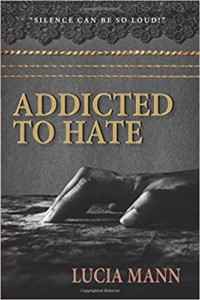Title: Addicted to Hate
Author: Lucia Mann
Publisher: Grassroots Publishing Group
ISBN: 978-0997567724
Pages: 328
Genre: Fiction
Reviewed by: Barbara Bamberger Scott
Pacific Book Review
Author and journalist Lucia Mann has created a dark, twisting fable of a woman’s trials and tribulations for sins she never committed.
The novel’s heroine, Maddie, is a child of rape, born in apartheid South Africa, daughter of an acceptably light-skinned father and an unacceptably dark Italian mother. It seems her birth is an augury of the strained, bizarre and often wretched life that is to come. As a young teen she is sent back to Italy, but after being robbed, she is waylaid by a psychopathic young man who sees in her the perfect victim, almost his personal slave. The couple settle in England, where she has been smuggled, possessing no legal papers. With him, though they have a life of mostly mute hatred, she has two daughters. From an early age her daughters, whom she loves with all her heart, begin to malign her, perhaps influenced by their evil father. A third daughter from another relationship only compounds the issues, seeming not only to despise her mother but also to be afflicted with many layers of mental illness. Throughout her child raising years Maddie, who has a very high IQ, ekes out an existence at menial jobs, at one time working as a servant or slave to a fortunately kindly couple. A doctor befriends her and others see her worth as time passes. Eventually she finds decent work first as a journalist, then as a spy, utilizing her multiple languages and high intelligence finally to gain more than basic subsistence. When she meets Hernando, she believes her problems are over, but her daughters will not leave her in the peace she feels she’s earned.
Mann’s life has many parallels to her central character: like Maddie she was born in South Africa of Italian heritage and migrated to Canada where she worked as a journalist. Mann is a noted advocate for the rights of those treated unfairly because of their skin color and an upstanding spokesperson against international slavery and prejudice wherever found. She writes her story in multi-layered flashbacks, skillfully, one could say painfully, depicting the agonies and ever-present dangers that append to women without legal status. Like Maddie they are often assumed to be prostitutes, prey to slavers and other domineering males, and rarely able to establish themselves comfortably for very long. Mann also examines a rare form of abuse: that of parents by their children.
One senses that Mann’s novel was conceived in her own private pain and myriad memories, so well does she convey her heroine’s many sufferings to her readers. Many women will identify with some aspect of Maddie’s troubled trail, and will want to read more from this competent, empathic writer.


